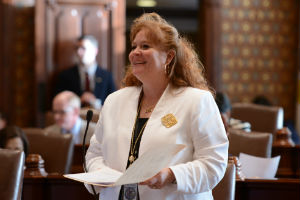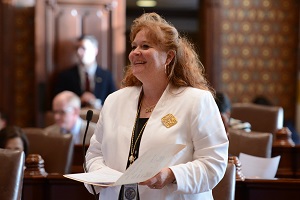Murphy to host clean energy town hall
- Details
 DES PLAINES – Area residents who wish to learn more about clean energy in Illinois are invited to a town hall meeting Tuesday, April 23, in Elk Grove.
DES PLAINES – Area residents who wish to learn more about clean energy in Illinois are invited to a town hall meeting Tuesday, April 23, in Elk Grove.
State Senator Laura Murphy (D-Des Plaines) will host the discussion at the Elk Grove Park District Garden Terrace along with State Representative Marty Moylan and State Representative Michelle Mussman.
The Illinois Sierra Club, Illinois Solar Energy Association and Citizens Utility Board will be speaking about Illinois programs regarding clean energy and ways to reduce your energy bills.
“Our state has been working on multiple programs to ensure that Illinois moves toward more clean energy in the future,” Murphy said. “This town hall offers residents a chance to learn about these different programs and how they can do their part as well.”
What: Town hall meeting regarding clean energy
When: 6:30 p.m. Tuesday, April 23
Where: Elk Grove Park District Garden Terrace in the Pavilion Meeting Room, 1000 Wellington, Elk Grove.
Who: State Senator Laura Murphy, State Representative Marty Moylan, State Representative Michelle Mussman, Illinois Sierra Club, Illinois Solar Energy Association, Citizens Utility Board
Murphy urges drivers to be more pedestrian friendly
- Details
 DES PLAINES – To help make roads safer, State Senator Laura Murphy (D-Des Plaines) advanced legislation last week that would require the Illinois Department of Transportation to look further into fatal car accidents that involve a pedestrian.
DES PLAINES – To help make roads safer, State Senator Laura Murphy (D-Des Plaines) advanced legislation last week that would require the Illinois Department of Transportation to look further into fatal car accidents that involve a pedestrian.
Murphy’s measure would require IDOT to conduct a traffic study after any fatal accident involving a pedestrian and release the results of that study to their website. This is the first step and starts the process to make changes to improve the safety of all people.
“It’s important that we are constantly looking at ways to improve safety in our communities,” Murphy said. “Road safety is important, but sometimes people forget about pedestrians and their safety. We need to become more pedestrian friendly and find solutions to why these accidents continue to occur.”
Senate Bill 1200 passed through the Senate unanimously last Thursday and now moves to the House for consideration.
Murphy’s bill would ensure students have access to their medicine
- Details
 SPRINGFIELD – Students would be allowed to self-administer prescribed medication while at school under legislation sponsored by Des Plaines Democrat State Senator Laura Murphy that passed the Senate today.
SPRINGFIELD – Students would be allowed to self-administer prescribed medication while at school under legislation sponsored by Des Plaines Democrat State Senator Laura Murphy that passed the Senate today.
Murphy’s measure would require schools to allow students with an action plan to self-administer prescribed medication with permission from their parent or guardian.
“Allowing children to self-administer their medicine while at school allows them to focus on their school work and gives parents the reassurance that their child has their medication if a problem arises while they aren’t at home,” Murphy said. “No parent wants to worry that their child might not be safe at school simply because they don’t have access to their medication.”
Senate Bill 1250 passed in the Senate and now moves to the House for consideration.
Murphy: ‘It’s time for the tollway to start fresh.’
- Details
 DES PLAINES – State Senator Laura Murphy (D-Des Plaines) released the following statement regarding the governor’s announcement of the new board directors for the Illinois Toll Highway Authority Board.
DES PLAINES – State Senator Laura Murphy (D-Des Plaines) released the following statement regarding the governor’s announcement of the new board directors for the Illinois Toll Highway Authority Board.
For months, Murphy has been vocal about the disturbing practices of the prior board and was part of a unanimous vote, from the Illinois State Senate for a measure to eliminated the current board, allowing the governor to re-fill those vacancies
“It’s time for the tollway to start anew” Murphy said. “With new directors and Gov. Pritzker’s leadership, I hope to see more transparency and accountability from the board. I am looking forward to a board who embraces these ideals and restores the public trust in the Tollway Authority. I am excited to see what this new chapter has in store.”
More Articles …
Page 97 of 137








